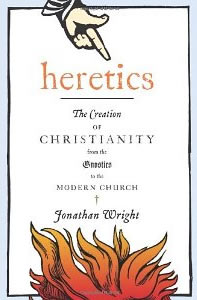Book Notes
 Jonathan Wright, Heretics; The Creation of Christianity from the Gnostics to the Modern Church (New York: Houghton Mifflin Harcourt, 2011), 338pp.
Jonathan Wright, Heretics; The Creation of Christianity from the Gnostics to the Modern Church (New York: Houghton Mifflin Harcourt, 2011), 338pp.
Back in grad school I remember reading Karl Barth describe Schleiermacher's theology as a "heresy of gigantic proportions." But Barth also expected to meet Schleiermacher in heaven. Did theological belief not have any bearing on one's eternal destiny? That's only one example of many interesting questions provoked by the fascinating interplay between orthodoxy (whatever that is) and heresy (whatever that is). Jonathan Wright has authored a remarkably readable book about a technical subject that's intended for a general audience.
The history of heresy is complicated. Sometimes it's hard to distinguish between hero and villain, and as times changed so did the epithets. Today Quakers enjoy a good reputation, but in the seventeenth century they were persecuted as socially disruptive radicals who refused to take oaths, pay taxes, or serve in the military. Many people posit a uniformly orthodox golden age when a core Christianity was believed "everywhere, always, by all" (Vincent of Lerins), but Wright shows how problematic that concept is. Much of the history of heresy has to do with the tangled relationship between church and state. Then there's the problem of viewing ancient heresy through our modern prism of religious pluralism and political toleration.
"This book is neither an apology for orthodoxy nor a rallying cry for the virtues of heresy" (12). Rather, "it is an examination of the Christian muddle" (12). Wright proceeds chronologically, beginning with the early church and ending with the American experiment. Yes, there are plenty of gruesome stories of people burned at the stake, especially from the medieval period onward when the state sponsored executions of heretics. Heretics were not only a theological or spiritual problem; they disrupted the political, social and economic fabric of society. Some heretics like Abelard or Voltaire came from the intellectual elite, while others were lay people. "The greatest heretical event of all" was the Protestant Reformation, for it "set about questioning more or less every aspect of traditional Christian practice and devotion" (165) by elevating individual conscience above any external authority. As the Thirty Years War showed, it took very little time for the persecuted to become the new persecutors.
Wright aims for genuine sympathy and objectivity. He's especially sensitive about interpreting the past in light of the present. He teases out nuances like the differences between toleration as a pragmatic strategy to preserve the social order and a principled concept of freedom of conscience as a human right. He acknowledges our own bigotries today and observes that the twentieth century was the bloodiest one in human history. One could easily write a similar book about Islam, Judaism (cf. Spinoza), or any other religion. Given the challenges of finite minds grasping the Infinite God, it's comforting to remember that justification by faith covers not only our moral shortcomings but also our intellectual ones.


